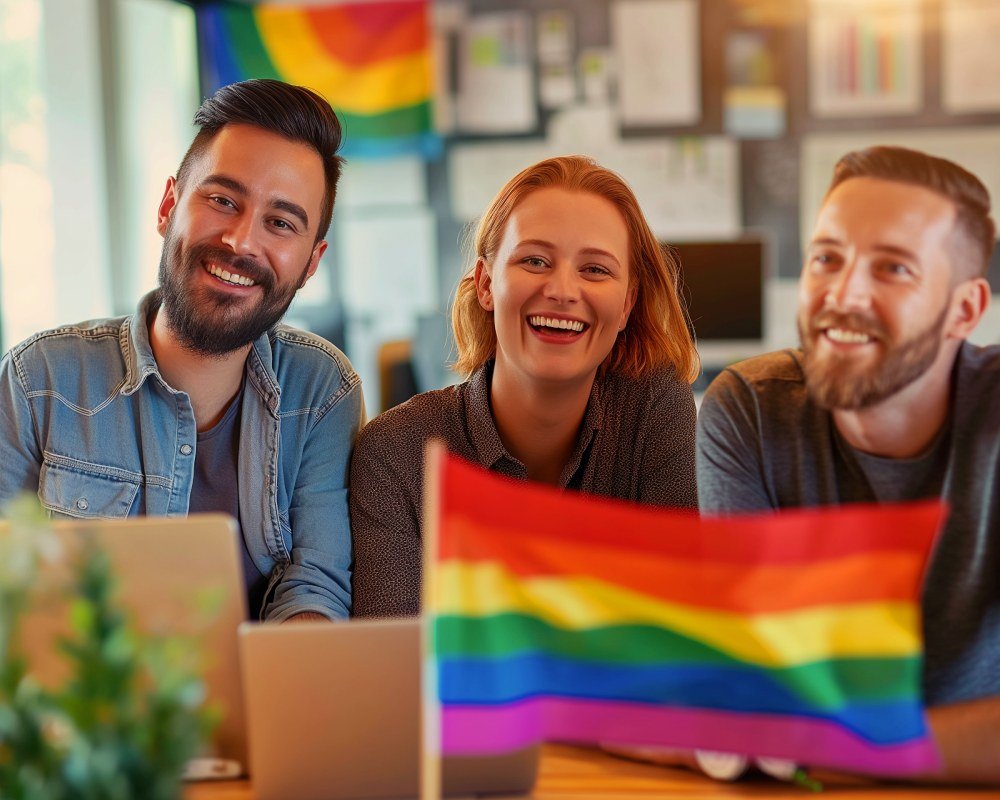
In today’s diverse and inclusive world, businesses must recognize the importance of having diverse marketing teams. Diverse teams bring a range of perspectives, experiences, and ideas that can significantly enhance the effectiveness of marketing campaigns. At Gay Thrive LGBTQ Marketing Agency, we understand that diversity in marketing teams leads to better campaigns. This blog will explore why diversity is crucial in marketing, how it impacts campaigns, and provide actionable tips for building and nurturing diverse marketing teams.
Understanding Diversity in Marketing
What is Diversity in Marketing?
Why Diversity in Marketing Teams Leads to Better Campaigns – Diversity in marketing refers to the inclusion of individuals from various backgrounds, including different genders, sexual orientations, ethnicities, ages, abilities, and socioeconomic statuses. In the context of LGBTQ+ marketing, it also includes representing Gay, Lesbians, Transgender, and Queer individuals within the team. A diverse marketing team reflects the broad spectrum of the customer base it aims to reach, ensuring that campaigns resonate with a wide audience.
The Importance of Diversity
Diversity is not just a buzzword; it is a business imperative. Diverse teams are more likely to understand and empathize with a variety of customer experiences, leading to more authentic and effective marketing strategies. In an increasingly globalized market, the ability to connect with diverse audiences is essential for business success.

Why Diversity in Marketing Teams Leads to Better Campaigns
1. Diverse Perspectives and Ideas
Innovation and Creativity
One of the primary reasons why diversity in marketing teams leads to better campaigns is the range of perspectives and ideas that diverse teams bring. Individuals from different backgrounds can offer unique insights and creative solutions, leading to more innovative and compelling campaigns. Diversity fosters creativity by challenging conventional thinking and encouraging new approaches to problem-solving.
Understanding Customer Needs
Diverse marketing teams are better equipped to understand the needs and preferences of a diverse customer base. Team members who share similar experiences with the target audience can provide valuable insights into their behaviors, motivations, and pain points. This understanding allows for the creation of more relevant and relatable content.
2. Authentic Representation
Avoiding Stereotypes and Tokenism
Diverse teams are more likely to avoid stereotypes and tokenism in their campaigns. Tokenism occurs when brands include LGBTQ+ individuals in their marketing solely for appearance’s sake, without genuine commitment to inclusivity. Diverse teams can help ensure that LGBTQ+ individuals are depicted authentically and respectfully, avoiding clichéd portrayals that can come across as insincere and exploitative.
Reflecting True Diversity
Authentic representation is key to connecting with LGBTQ+ audiences. Diverse marketing teams can help ensure that campaigns reflect the true diversity within the LGBTQ+ community, including Gay, Lesbians, Transgender, and Queer individuals. This authenticity builds trust and credibility with the audience, leading to more effective campaigns.
3. Enhanced Problem-Solving and Decision-Making
Broader Range of Solutions
Diverse teams bring a broader range of solutions to the table. When faced with a challenge, team members with different backgrounds and experiences can offer unique perspectives, leading to more comprehensive and effective solutions. This enhanced problem-solving capability is crucial for developing successful marketing strategies.
Reducing Groupthink
Groupthink occurs when a group makes decisions without critically evaluating alternative viewpoints, often leading to poor outcomes. Diversity in marketing teams reduces the risk of groupthink by encouraging diverse opinions and fostering a culture of healthy debate. This leads to better decision-making and more robust marketing campaigns.

4. Increased Customer Loyalty and Engagement
Building Stronger Connections
Customers are more likely to engage with brands that they feel understand and represent them. Diverse marketing teams can create campaigns that resonate with a wide audience, including LGBTQ+ customers. By authentically representing Gay, Lesbians, Transgender, and Queer individuals, brands can build stronger connections and increase customer loyalty.
Promoting Inclusivity
Inclusive marketing campaigns promote a sense of belonging and acceptance among customers. Diverse teams can ensure that campaigns are inclusive and respectful, fostering positive brand sentiment and customer engagement. This inclusivity can lead to higher customer satisfaction and retention rates.
5. Better Crisis Management
Anticipating Issues
Diverse teams are better equipped to anticipate potential issues and sensitivities that may arise in marketing campaigns. Team members from different backgrounds can provide valuable insights into how certain messages may be perceived by various segments of the audience. This foresight can help prevent missteps and ensure that campaigns are well-received.
Effective Response Strategies
In the event of a crisis, diverse teams can develop more effective response strategies. Their varied perspectives can help identify the root causes of the issue and develop appropriate solutions. This capability is essential for maintaining brand reputation and trust.
Recommended
Building and Nurturing Diverse Marketing Teams
1. Recruitment and Hiring
Inclusive Job Descriptions
To attract diverse talent, start with inclusive job descriptions. Use gender-neutral language and highlight your commitment to diversity and inclusion. Ensure that the qualifications and requirements are relevant and do not unintentionally exclude certain groups.
Diverse Sourcing Channels
Use diverse sourcing channels to reach a broad range of candidates. Partner with LGBTQ+ organizations, attend diversity job fairs, and utilize online platforms that cater to diverse job seekers. This approach ensures that your job openings are visible to a wide audience.
2. Creating an Inclusive Workplace Culture
Inclusive Policies and Practices
Implement inclusive policies and practices that support LGBTQ+ employees. This includes anti-discrimination policies, inclusive healthcare benefits, and support for transitioning employees. Why Diversity in Marketing Teams Leads to Better Campaigns, An inclusive workplace culture fosters a sense of belonging and encourages employees to bring their whole selves to work.
Employee Resource Groups
Establish Employee Resource Groups (ERGs) for LGBTQ+ employees. ERGs provide a safe space for employees to connect, share experiences, and advocate for change within the company. These groups play a crucial role in promoting diversity and inclusion within the workplace.
3. Providing Ongoing Education and Training
Diversity and Inclusion Training
Offer regular diversity and inclusion training for all employees. This training should cover topics such as unconscious bias, inclusive language, and cultural competency. Education is essential for creating a more inclusive and understanding workplace culture.
LGBTQ+ Awareness
Provide specific training on LGBTQ+ awareness. This training should cover the unique experiences and challenges faced by LGBTQ+ individuals and how to support them effectively. Increasing awareness helps create a more supportive and inclusive environment.
4. Encouraging Diverse Leadership
Representation in Leadership Roles
Ensure that LGBTQ+ individuals are represented in leadership roles within your marketing team. Diverse leadership is essential for driving inclusivity and ensuring that diverse perspectives are considered in decision-making processes.
Mentorship and Sponsorship
Implement mentorship and sponsorship programs to support the career development of LGBTQ+ employees. Mentorship provides guidance and support, while sponsorship involves advocating for employees’ career advancement. Both programs are crucial for nurturing diverse talent.

5. Fostering Open Communication
Creating Safe Spaces
Create safe spaces for open communication where employees feel comfortable sharing their ideas, experiences, and concerns. This can include regular team meetings, feedback sessions, and anonymous suggestion boxes. Open communication fosters trust and encourages diverse perspectives.
Listening and Responding
Actively listen to your employees and respond to their feedback. Show that you value their input and are committed to making necessary changes. This responsiveness builds trust and demonstrates your commitment to inclusivity.

Real-World Examples of Diverse Marketing Teams Leading to Better Campaigns
Example 1: Microsoft’s “We All Win” Campaign
Microsoft’s “We All Win” campaign, which aired during the Super Bowl, showcased the company’s commitment to diversity and inclusion. The campaign featured individuals with disabilities using the Xbox Adaptive Controller, highlighting the importance of accessible technology. Microsoft’s diverse marketing team played a crucial role in creating a campaign that resonated with a wide audience and promoted inclusivity.
Example 2: Starbucks’ “What’s Your Name” Campaign
Starbucks’ “What’s Your Name” campaign celebrated the transgender community by featuring the story of a young transgender person finding their true name. The campaign was created in collaboration with transgender individuals and organizations, ensuring authentic representation. The diverse marketing team behind the campaign helped Starbucks connect meaningfully with the LGBTQ+ community.
Example 3: Procter & Gamble’s “The Talk” Campaign
Procter & Gamble’s “The Talk” campaign addressed the difficult conversations Black parents have with their children about racism. The campaign was developed by a diverse marketing team that included Black employees who shared their personal experiences. This authenticity resonated deeply with the audience and highlighted the importance of diversity in marketing.
Why Diversity in Marketing Teams Leads to Better Campaigns – Conclusion
Diversity in marketing teams leads to better campaigns by bringing a range of perspectives, experiences, and ideas that enhance creativity, problem-solving, and decision-making. Why Diversity in Marketing Teams Leads to Better Campaigns – Diverse teams ensure authentic representation, promote inclusivity, and build stronger connections with customers. By following best practices for building and nurturing diverse marketing teams, brands can create more effective and impactful marketing strategies.
At Gay Thrive LGBTQ Marketing Agency, we are committed to helping brands understand and embrace the importance of diversity in marketing. Why Diversity in Marketing Teams Leads to Better Campaigns, By fostering inclusivity and leveraging the unique strengths of diverse teams, your brand can create campaigns that resonate with Gay, Lesbians, Transgender, and Queer customers and build a strong brand identity.
For more insights and to learn how Gay Thrive LGBTQ Marketing Agency can help your brand succeed in LGBTQ+ marketing, visit our website at Gay Thrive.

More Recommended
How Gay-Owned Brands are Paving the Way for LGBTQ+ Acceptance Through Advertising
How Gay-Owned Brands are Paving the Way for LGBTQ+ Acceptance Through Advertising As society continues [...]
Behind the Scenes: The Stories of Lesbian Entrepreneurs Making Waves in the Advertising Industry
The Stories of Lesbian Entrepreneurs Making Waves in the Advertising Industry Lesbian entrepreneurs are making [...]
Diversifying Your Portfolio: The Business Case for Supporting Gay-Owned Businesses Through Marketing
Diversifying Your Portfolio: The Business Case for Supporting Gay-Owned Businesses Through Marketing – Are you [...]
Inclusivity Sells: The Power of LGBTQ+ Marketing in Attracting Diverse Consumers
Inclusivity Sells: The Power of LGBTQ+ Marketing in Attracting Diverse Consumers When it comes to [...]
Why Do Gays Face Higher Rates of Depression?
Why Do Gays Face Higher Rates of Depression? – Why Do Gays Face Higher Rates [...]
Why Is It Important to Have Gay Role Models?
Why Is It Important to Have Gay Role Models? – Having role models is essential [...]
Challenges and opportunities of lesbian-targeted advertising in a changing cultural landscape
Challenges and Opportunities of Lesbian-Targeted Advertising in a Changing Cultural Landscape As the cultural landscape [...]
Why Do Some People Think Being Gay Is a Choice?
Why Do Some People Think Being Gay Is a Choice? – Being gay is not [...]
What Are The Gay Marriage Benefits?
What Are The Gay Marriage Benefits? A Comprehensive Exploration of Same-Sex Marriage Advantages and Financial [...]